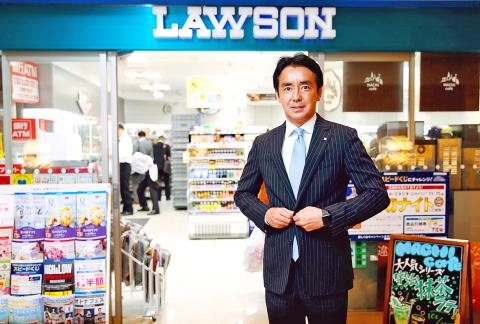Japan’s second-biggest convenience stores operator Lawson Inc is looking to buy other chains in the US as it speeds up overseas expansion, with the aim of boosting its number of overseas outlets by about a quarter within a year.
“In the US where the market is mature, mergers and acquisitions are a simple and straightforward way for us to expand, which would also allow us to buy time to boost the number of shops,” Sadanobu Takemasu, who became Lawson president and chief operating officer on Wednesday, said in an interview.
Lawson is not working on any deals at the moment, although it could take place any time given the opportunity, according to the 46-year-old, who said in the Tokyo interview he plans to also focus on expanding in Southeast Asia. The company, which operates about 12,500 stores in Japan and 793 outside the country, is targeting a 26 percent increase to 1,000 overseas shops by February next year.

Photo: Reuters
Lawson and other chains such as Seven & i Holdings Co’s 7-Eleven and FamilyMart Co are seeking overseas expansion while competing to displace conventional grocery shops and restaurants domestically, amid economic malaise in Japan.
Lawson shares fell as much as 1 percent to ¥8,690 in Tokyo trading, while Seven & i lost as much as 2.3 percent and FamilyMart declined 0.9 percent. The benchmark TOPIX index fell as much as 1.7 percent.
Lawson has a 5.3 percent market share of Japan’s grocery retail sales, second only to 7-Eleven’s 12.2 percent share, according to data from Euromonitor International.
The Seven & i-owned chain also leads Japan’s fast-food market with a 33.8 percent share, followed by Lawson with 12.4 percent.
Japanese Prime Minister Shinzo Abe on Wednesday said he is postponing an increase in sales tax to October 2019 and promised bold economic steps, as the government seeks to avoid depressing private consumption.
The company “respects” the Japanese government’s decision to postpone the sales tax increase and plans to prepare for it accordingly, Takemasu said, adding that any changes in sales tax prospects would have had a temporary impact on Lawson’s business.
“In Japan, I want to focus resources on the existing businesses to strengthen them,” Takemasu said. “So I’m not considering adding new businesses to our Japan portfolio through mergers and acquisitions for now.”
Lawson has lagged its competitors in expanding abroad. Seven & i has about 40,000 shops outside Japan, while FamilyMart has about 6,000.
The company’s US aspirations echo those of Seven & i president Ryuichi Isaka, who said in an interview last month that he plans to increase the number of 7-Eleven outlets in the country to boost its market share that stands at about 6 percent.
Lawson in April forecast an operating loss of ¥2.9 billion (US$26.62 million) at its overseas stores for the fiscal year ending February next year.
Takemasu said he aims to turn the unit profitable in the following fiscal year.
“It will require Lawson a considerable effort to catch up with Seven & i and FamilyMart overseas,” SMBC Nikko Securities Inc analyst Yoshiyuki Namiki said. “Realistically, it’s tough for Takemasu to achieve something in a couple of years.”

The Eurovision Song Contest has seen a surge in punter interest at the bookmakers, becoming a major betting event, experts said ahead of last night’s giant glamfest in Basel. “Eurovision has quietly become one of the biggest betting events of the year,” said Tomi Huttunen, senior manager of the Online Computer Finland (OCS) betting and casino platform. Betting sites have long been used to gauge which way voters might be leaning ahead of the world’s biggest televised live music event. However, bookmakers highlight a huge increase in engagement in recent years — and this year in particular. “We’ve already passed 2023’s total activity and

Nvidia Corp CEO Jensen Huang (黃仁勳) today announced that his company has selected "Beitou Shilin" in Taipei for its new Taiwan office, called Nvidia Constellation, putting an end to months of speculation. Industry sources have said that the tech giant has been eyeing the Beitou Shilin Science Park as the site of its new overseas headquarters, and speculated that the new headquarters would be built on two plots of land designated as "T17" and "T18," which span 3.89 hectares in the park. "I think it's time for us to reveal one of the largest products we've ever built," Huang said near the

China yesterday announced anti-dumping duties as high as 74.9 percent on imports of polyoxymethylene (POM) copolymers, a type of engineering plastic, from Taiwan, the US, the EU and Japan. The Chinese Ministry of Commerce’s findings conclude a probe launched in May last year, shortly after the US sharply increased tariffs on Chinese electric vehicles, computer chips and other imports. POM copolymers can partially replace metals such as copper and zinc, and have various applications, including in auto parts, electronics and medical equipment, the Chinese ministry has said. In January, it said initial investigations had determined that dumping was taking place, and implemented preliminary

Intel Corp yesterday reinforced its determination to strengthen its partnerships with Taiwan’s ecosystem partners including original-electronic-manufacturing (OEM) companies such as Hon Hai Precision Industry Co (鴻海精密) and chipmaker United Microelectronics Corp (UMC, 聯電). “Tonight marks a new beginning. We renew our new partnership with Taiwan ecosystem,” Intel new chief executive officer Tan Lip-bu (陳立武) said at a dinner with representatives from the company’s local partners, celebrating the 40th anniversary of the US chip giant’s presence in Taiwan. Tan took the reins at Intel six weeks ago aiming to reform the chipmaker and revive its past glory. This is the first time Tan